From July 18 to July 21, experts from the University's Miller Center will provide political expertise at the Republican National Convention in Cleveland, OH.
About 2,470 delegates and 2,302 alternate delegates from 50 states, the District of Columbia and five territories will gather at the convention, where the GOP’s nominee for president and vice president will be officially announced.
LexisNexis — a digital research company as well as the official research provider of the conventions — invited the center to provide historical perspective and details at the event.
About 15,000 media organizations will be reporting credentials, and the center’s experts are there to give comprehensive analysis in response to reporters’ questions about topics such as the role of conventions in the election, the importance of running mate selection and the historic nature of both parties' nominees.
Barbara Perry, the center’s director of presidential studies and co-chair of the Presidential Oral History Program, said she looked forward to coming on-site at a political convention for the first time and was excited to contribute.
“I have worked [for] all three branches of the government. I worked at Capitol Hill for my senator, the justice department and the Supreme Court as a fellow,” Perry said. “My expertise [comes from] education, practical experience, life-long interest and passion and my couple of books on American government, politics, the presidents, as well as the Supreme Court.”
Perry said several media outlets and freelance writers have already reached out to her for her commentary and expertise.
“One was from the Los Angeles Times [asking] what the key conventions in American history are. The reporter did not define ‘key,’ and that to me could mean several things,” Perry said.
Assistant Presidential Studies Prof. Nicole Hemmer said in an email statement that the center’s presence would contribute to more in-depth discussions of the political environment.
“So much of political journalism is caught up in the immediacy of the moment, and we'll be widening the lens, taking a step back to make sense of everything from a historical and scholarly perspective,” Hemmer said.
Hemmer is a contributing editor at US News & World Report — where she writes a weekly column on politics and history — co-host of the weekly Past Present podcast; and a fortnightly columnist for The Age, a newspaper based in Melbourne, Australia.
The center’s function at the University as well as the significance of its presence at the convention is reflected in her projects.
“[They are] to offer a new way of understanding the present by looking to the past, and to offer engaged scholarship in the public interest,” Hemmer said.
When it comes to analyzing some unique modern-day political phenomena — such as Donald Trump’s rise in the 2016 election — historical approaches might be hard to apply, but could enable the public to recall previous cases where presidential candidates were not utterly qualified, Perry said.
“He is unprecedented. There have only been one or two presidents who had zero political and military experience,” Perry said. “[So the question becomes], what might it mean to have a president who is completely unprecedented, in terms of background and a lack of knowledge of the Government and the Constitution?’”
Ross Perot, a former businessman who later became a third-party presidential candidate in 1992, and George Washington, who was trusted to have the ability to deal with a new constitution and a new system despite having little experience of being a politician, were both unprecedented candidates, Perry said.
The role and extent of the public’s participation in electing presidents have changed over time.
“The founding fathers wanted us to have a republic, not a democracy. People did not vote directly, and decision-makers were chosen by only male, white, and property owners,” Perry said. “Now every American over 18 years old could vote and it is a very democratized way of choosing candidates.”
When providing analysis, experts from the center will adhere to a non-partisan objective.
“Scholars certainly have informed opinions and distinct perspectives shaped by our research and backgrounds, but the key word there is ‘informed’ — we're speaking from a place of scholarship, not partisanship,” Hemmer said.
This scholarship was based on the belief that Americans understand the present the best when they understand the past, Hemmer added.
Perry said she carried out this attitude in her teaching career and was immersed in objective viewpoints.
She and Hemmer, along with LexisNexis, will be at the RNC to provide nonpartisan commentary and rhetoric.







